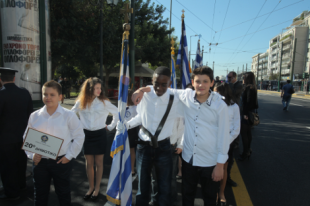Parading is very important for Greeks. Most children will remember the times they took part in the school parades to celebrate 25 March and 28 October, Greece's two (so far) national days. My children love to wear their blue and white (usually blue jeans and a white shirt/blouse to take part in the parade. Although I am not a great fan of military parades, my heart was softened by some of this year's sights in Alikianos, a central village close to my children's schools, which suffered heavy losses during WW2.



This little girl was waiting on the sidelines with her parents. She was carrying a hand-drawn flag which she had probably made at school, with a teacher's guidance, as is the custom in Greek primary schools before such events. She is most likely born in Greece - her parents were speaking Bulgarian - and Greece is the only country she has known. She will make a good Greek citizen when she is older.

These children come from the local village kindergarten. They look well nourished, well dressed, healthy and happy. They have all probably been born in Greece - but they are most likely not all of Greek heritage.

My kids play in multi-cultural sports groups with mainly Easter European chidlren, but there is also one black child in their group, something that makes me very proud to see, especially now that Greeks are regarded as an extremely racist race, as if everyone is a Golden Dawn supporter, or they all kick Roma children on the street. This black child was the Greek flag bearer at a school in Athens, a privilege you get only if you are one of the best students in the class.

In the past, it was common - for patriotic reasons - for riots to start up when a child that wasn't of Greek heritage was allowed to carry the flag, but this year, it seems that we have matured.
©All Rights Reserved/Organically cooked. No part of this blog may be reproduced and/or copied by any means without prior consent from Maria Verivaki.
No comments:
Post a Comment